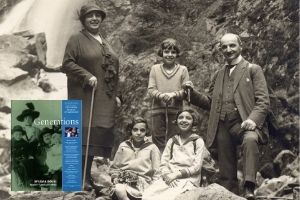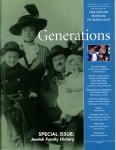Dispossession and Adaptation Part V

 Article written by Anita Kassof, former JMM associate director. Originally published in Generations – Winter 2002: Jewish Family History. Information on how to purchase your own copy here. Many thanks to JMM collections manager Joanna Church for re-typing this article.
Article written by Anita Kassof, former JMM associate director. Originally published in Generations – Winter 2002: Jewish Family History. Information on how to purchase your own copy here. Many thanks to JMM collections manager Joanna Church for re-typing this article.
Part V: Making a New Life
Missed the beginning? Start here.
In the meantime, the enterprising Weil sisters had found better jobs, Erna at Johns Hopkins University, Lisa in an office, and Toni in a mattress factor. They worked long hours and sometimes skipped meals so they could afford to pay rent on a small apartment, send their parents a stipend in France, purchase them trans-Atlantic tickets, pay the hefty storage fee for their lifts of furniture, which would not fit in their modest furnished rooms, and put a down payment on a house.
Erna acknowledged how remarkable it was that three unmarried women, all in their twenties, in the U.S. for less than a year, managed to secure a mortgage. She recalled that the tidy little house, which they purchased when it was under construction on Jonquil Avenue, cost them $4,500 plus a $95 ground rent. The day before their parents reached New York, movers brought the furniture from their lifts to their new home.
Theo and Hilda arrived in Baltimore physically weakened and emotionally depleted. Their minds were still very much on their recent ordeal, which became a point of reference for their new experiences in Baltimore. On a trip to the grocery store soon after her arrival, Hilda looked around and, still haunted by her incarceration, commented that the food in the store that day could have fed the entire population of Gurs for a year. Theo and Hilda settled into a quiet, somewhat isolated retirement. Hilda, a gifted pianist, often played the grand piano that had come in the lift from Germany. Since neither she nor Theo drove, and they were hesitant to take the streetcar downtown, they spent most of their time in the little house on Jonquil Avenue. They knew few other refugees, although they were active with the Chevra Ahavas Chesed, a burial society and self-help organization founded by émigrés from Germany in 1939.
The contrast between the eagerness with which young immigrants like Erna, Lisa, and Toni greeted life in America, and the passivity with which members of their parents’ generation faced their new and altered existence, is typical among most refugee groups, particularly the German Jews. The girls were disappointed and disillusioned by the Nazi interlude, but they were certainly not destroyed. After all, young refugees had no choice but to pick up interrupted educations, start or restart young careers, and look to the future. Members of their parents’ generation, on the other hand, tended to be overwhelmed by the prospect of starting over from scratch. Those, like the Weils, who were fortunate to have younger relatives to care for them settled into retirement, looking back toward lives that they had almost, but not quite, completed in Germany, and battling quietly with the demons of loss and regret.
Erna, Lisa, and Toni, meanwhile, worked tirelessly to educate themselves, build careers, and acclimate to life in America. While their house on Jonquil Avenue was under construction, Toni visited the site often, fascinated with the process of construction and happy to be in the fresh air after her long days in the mattress factory. Soon, the owner of the construction company offered her a job. She discovered that suppliers and employees had been stealing from him, and she quickly put his books in order. He rewarded her with regular promotions. Eventually, she became familiar with all aspects of the construction business, even learning to operate a bulldozer. For seven years, all three girls held down full-time jobs and attended Johns Hopkins University at night, studying civil engineering and construction. Erna says proudly that they paid their own way, never borrowing a dime for tuition. After graduation, Toni opened her own construction business, taking Erna as a partner. Lisa became an industrial engineer in Washington, D.C.
In 1945, Toni married a handsome soldier named Julius Mandel, himself a refugee from Austria, who had come to the U.S. in 1939. They had one daughter, Brenda who lives with Julius in Baltimore. Toni died in 1995. Erna was married in 1959, to a survivor of the Holocaust, and also made her life in Baltimore. Lisa, who never married, died in 1993.
The Weil sisters faced a devastating situation not with despair, but by marshaling their resources to build new lives for themselves and their parents. They had grown up in comfort and security, but they were never coddled. To their parents’ credit, the girls had the inner resources – an unimpeachable work ethic, dogged determination to improve themselves, and no patience for self-pity – that enabled them to rescue their family and to persevere. While they were still very young women, the Weil sisters displayed the presence of mind to encourage the family’s emigration, to adapt to life in England, and to embrace life in America. They responded to an extraordinary set of circumstances by reinventing themselves again and again, and in teh process, saved their family from destruction.
~END~
All quotations and family history information are based on oral interviews with Toni Weil (JMM OH 0246, July 8, 1990), Julius Mandel (JMM OH 0268, June 23, 1991), Erna Weil, and Brenda Weil Mandel, and on materials in the Mandel collection (JMM L2002.102).
